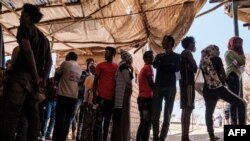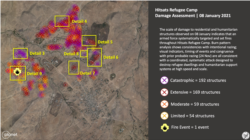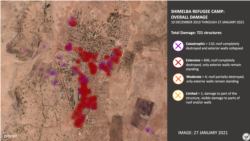As the conflict in Ethiopia’s Tigray region rages on, international observers are sounding alarm bells about the involvement of forces from neighboring Eritrea.
The U.S. State Department says it has received credible reports of looting, sexual violence, assaults in refugee camps and other human rights abuses. It cited evidence that Eritrean soldiers are forcibly returning Eritrean refugees to their home country.
The U.S. administration also said it has received credible reports that Eritrean forces launched artillery attacks from their side of the border in support of Ethiopian government troops fighting forces of the Tigrayan People’s Liberation Front (TPLF).
“The United States has stressed the need for all Eritrean troops to leave Tigray immediately,” a State Department spokesperson told VOA this week. “The United States is urging an immediate stop to the residual fighting and full, safe, and unhindered humanitarian access to assist vulnerable populations in Tigray.”
Ambassador Dina Mufti, spokesperson for Ethiopia’s Ministry of Foreign Affairs, said the Ethiopian government has “seen reports” that Eritrean troops had entered the country but did not confirm it. He said it is not surprising that Eritrea would move to defend its border due to the “belligerent attitude” of the TPLF, but he denied that Ethiopia had solicited Eritrean support.
“There has never been a need from the Ethiopian side to request a third-party involvement in the matter,” Dina said during a January 20 press conference. “The issue has been entertained by some circles that wanted to portray the operation as a regional-level conflict.”
The Tigray conflict erupted in early November after months of rising tensions between the government of Ethiopian Prime Minister Abiy Ahmed and the TPLF. The TPLF dominated Ethiopia’s national government for nearly 30 years until Ahmed won power in 2018.
Major General Belay Seyoum, head of the Northern Command of Ethiopia’s National Defense Force, said recently that “a foreign army that is unwanted entered,” during a town hall meeting in Tigray.
But one close observer believes Eritrea’s President Isaias Afwerki is acting militarily with the full support of Prime Minister Abiy.
Mesfin Hagos, a founding member of the Eritrean People’s Liberation Front (EPLF) in 1970, led troops as a field commander during the country’s struggle for independence from Ethiopia and served as the country’s minister of defense.
Now living in Germany, Mesfin said an invasion of northern Ethiopia has long been a goal of Eritrea’s president. He pointed out that, while discussing the peace agreement between the two countries in 2018, Isaias made clear that his intention was to stomp out the TPLF.
“When the Eritrean president accepted the call from Ethiopia, the first thing he said was ‘game over’ to TPLF,” Mesfin told VOA. “That was a game over declaration from him. From then on, it shows that he was determined to finish off the TPLF.”
From 1998 to 2000 Eritrea went to war with Ethiopia over a disputed border territory and other issues. Isaias, a bitter enemy of late Ethiopian Prime Minister Meles Zenawi who led the TPLF, believed that the TPLF harbored Eritrean opposition forces in northern Ethiopia.
“Our sources inside Eritrea tell us that Isaias believed that the TPLF elimination will bring with it the elimination of the opposition against the Isaias regime that has the slightest chance of posing a threat to his regime,” Mesfin said.
There is also evidence that Eritrea supported Ethiopian efforts early in the Tigray conflict.
Following a November 4 attack on the Ethiopian National Defense Force’s Northern Command in Tigray by TPLF forces, Ethiopian troops were scattered and ordered to retreat to positions inside Eritrea. From there, Mesfin said, they regrouped and launched a counterattack with the full support of both governments.
“Abiy admitted that the surviving troops were ordered to cross the border to Eritrea. He did that knowing that they will be receiving a friendly army,” Mesfin said. “In fact, they were hosted and made an arrangement to regroup and reorganize the Ethiopian army and of course, started attacking the Tigray region by crossing the border from Eritrea.”
Mesfin said Eritrean forces entered northern Ethiopia and took control of refugee camps where Eritreans had been living.
“Almost every refugee in these refugee camps are under the mercy of the Eritrean troops. They can be taken anywhere at any time and we hear that so many Eritreans are being killed and so many of them are unaccounted for,” Mesfin said.
Satellite images analyzed by the U.K.-based DX Open Network, an open-source investigations group, show that two refugee camps, Hitsats and Shimelba, which had hosted 25,000 Eritrean refugees, have been demolished.
“There are clear and consistent patterns across both camps over a two-month period demonstrating that these refugee camps were systematically targeted, despite their protected humanitarian status,” DX Open Network said in a statement.
Members of Eritrea’s diaspora are speaking out against the country’s involvement.
An open letter signed by about 1,000 people published on change.org denounces “the role of the Eritrean military in subjecting the people of Tigray and Eritrean refugees in Tigray to conditions that led to killings, pillaging, sexual violence, destruction of heritage sites and displacement.”
It says people inside Eritrea are afraid to voice their opinions so members of the global diaspora must speak on behalf of people who are “muffled and silenced.”
“We urge the world community and international and regional organizations to pressure the Ethiopian federal government and President Isaias and his associates to end the war,” the letter reads.
State Department correspondent Nike Ching contributed to this report.







